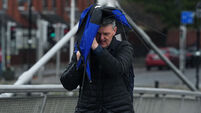Residents at two privately-run Irish nursing homes were left to sit in their own urine and subjected to manhandling by staff, among many other abuses, a bombshell new investigation shows.
RTÉ Investigates will tonight broadcast Inside Ireland’s Nursing Homes, the result of a months-long undercover investigation at two nursing homes — The Residence in Portlaoise and Beneavin Manor in north Dublin City. The programme details a litany of questionable behaviour and practices, including:
Already a subscriber? Sign in
You have reached your article limit.
Subscribe to access all of the Irish Examiner.
Annual €130 €80
Best value
Monthly €12€6 / month
Introductory offers for new customers. Annual billed once for first year. Renews at €130. Monthly initial discount (first 3 months) billed monthly, then €12 a month. Ts&Cs apply.
CONNECT WITH US TODAY
Be the first to know the latest news and updates











